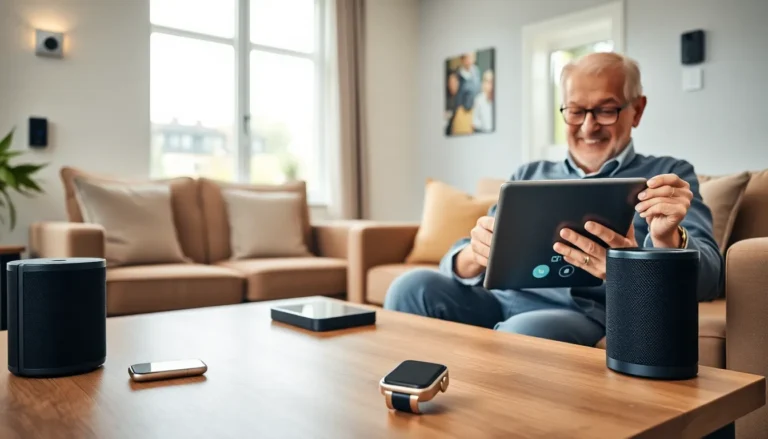The Internet of Things (IoT) is more than just a buzzword, it’s a revolution. Imagine a world where your fridge tells you when you’re out of milk, or your thermostat learns your preferences. Sounds like something from a sci-fi movie, right? But this is reality. With devices connected to the internet in ways we couldn’t have imagined a decade ago, navigating the landscape of IoT keywords is essential for anyone looking to make their mark. Whether you’re a seasoned tech guru or just starting out, understanding these keywords can mean the difference between being left in the dust or riding the IoT wave. So, grab your digital surfboard as we jump into a comprehensive guide on the most relevant IoT keywords in today’s landscape.
Table of Contents
ToggleUnderstanding The Internet Of Things

To grasp the concept of IoT, one must start at the basics. The Internet of Things refers to the interconnection of everyday devices through the internet, enabling them to send and receive data. This means your coffee maker can communicate with your smartphone, allowing you to brew that much-needed caffeine from the comfort of your bed. Not only does this create convenience, but it also results in enhanced efficiency across various sectors, such as healthcare, transportation, and agriculture. IoT devices cover a wide range of applications, including smart home gadgets, wearables, and industrial equipment. With millions of devices at play, it’s no wonder that carefully selecting the right IoT keywords can greatly enhance visibility and engagement in the digital realm.
Key Categories Of IoT Keywords
To effectively target an audience, it’s vital to categorize IoT keywords. Here are some key categories and a few essential keywords that fall under them:
Essential IoT Keywords To Consider
- Smart Home: includes terms like smart thermostat, home automation, and security cameras.
- Industrial IoT: terms like predictive maintenance, supply chain management, and asset tracking.
- Wearable Technology: keywords include fitness tracker, smartwatches, and health monitors.
- IoT Security: encompass phrases like data privacy, encryption, and threat detection.
- Smart Cities: involve keywords such as traffic management, smart grids, and environmental monitoring.
Crafting content around these categories not only helps in SEO but also addresses the specific needs and interests of diverse audiences.
Emerging Trends In IoT Keywords
The world of IoT keywords is ever-evolving. Some trends that are gaining traction include:
- 5G Technology: With the rollout of 5G, keywords associated with high-speed connections and real-time data processing are becoming increasingly important.
- Edge Computing: This concept focuses on processing data closer to where it’s generated, leading to keywords like edge analytics and real-time processing gaining importance.
- AI Integration: As artificial intelligence melds with IoT for smarter solutions, keywords like AI-enabled devices and machine learning will dominate.
- Sustainability: Eco-friendly IoT solutions are on the rise, leading to the importance of keywords such as green technology and energy-efficient devices.
Keeping an eye on these trends can ensure content remains timely and relevant.
Optimizing Content With IoT Keywords
Once the right IoT keywords have been identified, optimizing content becomes crucial. Here are tips to seamlessly integrate these keywords:
- Natural Placement: Keywords should fit naturally within the content context. Avoid stuffing and make sure they enhance the message.
- Meta Descriptions: Include primary IoT keywords in meta descriptions to improve click-through rates from search engines.
- Header Tags: Use keywords in header tags to provide structure and context for readers and search engines alike.
- Image Alt Text: Don’t overlook visual content, use IoT keywords in image alt text to further bolster SEO.
By consistently applying these practices, your content can rank higher and attract more organic traffic.
Tools For IoT Keyword Research
With the right tools, finding relevant IoT keywords becomes manageable:
- Google Keyword Planner: A classic tool that provides data on keyword volume and competition.
- Ahrefs: This comprehensive tool allows users to analyze keyword difficulty and related keywords.
- SEMrush: A favorite among SEO professionals, SEMrush provides deep insights into keyword strategies used by competitors.
- Ubersuggest: This tool offers keyword suggestions based on user intent and is especially user-friendly.
Utilizing these tools can streamline the keyword research process, revealing opportunities for better content creation.





